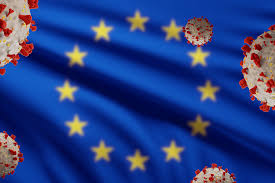
After five days of intense talks, European Union leaders manage to agree on a record novel coronavirus economic package of 750 billion euro ($858 billion) to rescue and revive the economies of the EU battered by the pandemic.
In a unanimous vote in Brussels, heads of state and government jointly agreed to issue debt jointly that will be distributed through grants and loans to member countries that are facing the worst possible recession since the Great Depression of the 1930s.
The financial package agreement between the 27 member countries of the bloc was described as "truly historic" by German Chancellor Angela Merkel. The effort to push the deal through was led by Merkel and the French President Emmanuel Macron.
Some of the strongest economies of Europe such as Netherlands, Sweden, Denmark and Austria were pitted against some of the weakest such as Spain and Italy during the five day negotiations over the package. The major sticking point in the negotiations was the issue of how the burden of the package be shared and the conditions under which the money would be distributed among the member states.
The demand of the stronger economies was that loans should form the majority of thee rescue package. Ultimately the EU leaders agreed to split up the huge sum into two parts – one of 360 billion euros ($412 billion) to be distributed as loans while the rest 390 billion euros ($446 billion) as grants which will not have to be repaid at all. The EU will raise the money collectively through bond selling.
A seven-year EU budget worth about 1.1 trillion euros ($1.26 trillion) was also discussed at the five day talks in the Belgian capital, in addition to the terms of the economic recovery package.
The agreement was described as a "pivotal moment" for Europe by European Commission President Charles Michel in a news conference, and said that the bloc's solidarity at a historically trying time was exhibited by this decision.
"This agreement sends a concrete signal that Europe is a force for action," Michel said.
Though originally planned for just two days, the negotiations were stretched as long as they did because of fear of failure which could have cats serious doubts over the future of the EU as an effective bloc.
"A few clashes" during the talks but said "that's all part of the game" was acknowledged by the Dutch Prime Minister Mark Rutte, viewed to be a key obstacle to a deal.
Europe "has shown it is able to break new ground in a special situation," Merkel said.
"Exceptional situations require exceptional measures," she said at the news conference
(Source:www.npr.org)
In a unanimous vote in Brussels, heads of state and government jointly agreed to issue debt jointly that will be distributed through grants and loans to member countries that are facing the worst possible recession since the Great Depression of the 1930s.
The financial package agreement between the 27 member countries of the bloc was described as "truly historic" by German Chancellor Angela Merkel. The effort to push the deal through was led by Merkel and the French President Emmanuel Macron.
Some of the strongest economies of Europe such as Netherlands, Sweden, Denmark and Austria were pitted against some of the weakest such as Spain and Italy during the five day negotiations over the package. The major sticking point in the negotiations was the issue of how the burden of the package be shared and the conditions under which the money would be distributed among the member states.
The demand of the stronger economies was that loans should form the majority of thee rescue package. Ultimately the EU leaders agreed to split up the huge sum into two parts – one of 360 billion euros ($412 billion) to be distributed as loans while the rest 390 billion euros ($446 billion) as grants which will not have to be repaid at all. The EU will raise the money collectively through bond selling.
A seven-year EU budget worth about 1.1 trillion euros ($1.26 trillion) was also discussed at the five day talks in the Belgian capital, in addition to the terms of the economic recovery package.
The agreement was described as a "pivotal moment" for Europe by European Commission President Charles Michel in a news conference, and said that the bloc's solidarity at a historically trying time was exhibited by this decision.
"This agreement sends a concrete signal that Europe is a force for action," Michel said.
Though originally planned for just two days, the negotiations were stretched as long as they did because of fear of failure which could have cats serious doubts over the future of the EU as an effective bloc.
"A few clashes" during the talks but said "that's all part of the game" was acknowledged by the Dutch Prime Minister Mark Rutte, viewed to be a key obstacle to a deal.
Europe "has shown it is able to break new ground in a special situation," Merkel said.
"Exceptional situations require exceptional measures," she said at the news conference
(Source:www.npr.org)





